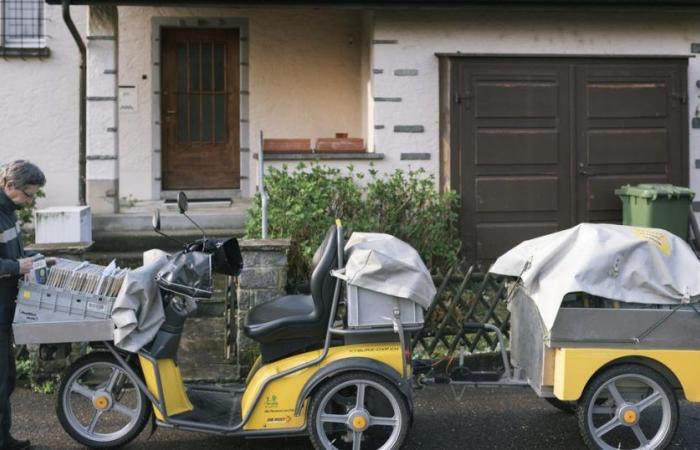La Poste must have more flexibility in distribution. The Federal Council proposes that only 90% of letters and packages be delivered on time. The yellow giant will no longer be required to go to all houses inhabited all year round.
The Federal Council presented on Friday the broad outlines of a revision of the ordinance on La Poste.
The Post Office is required by law to ensure mail delivery, but it does not receive public subsidies for this. It must then be self-financing, notably via stamps.
However, the volume of mail has decreased by a third over the last ten years. The number of cash payments at the counter has even collapsed by almost two thirds. And the number of letters sent is expected to decline by around 34 to 39% by 2030, or 115 letters per person per year (compared to 220 in 2021). As for cash payments, they could even decrease by 80%.
The proposed measures should allow La Poste to save up to 45 million francs per year by 2026.
More flexible mail delivery
As a first step, the Post Office must obtain more flexibility for the delivery of mail and packages. In the future, Swiss Post is expected to deliver only 90% of letters and packages on time, compared to 97% and 95% respectively currently.
“It is above all a question of allowing La Poste, in exceptional situations, to deliver packages later, I am thinking for example of the Christmas period,” explained Federal Councilor Albert Rösti (UDC) on Friday.
Serving isolated areas no longer mandatory
The obligation to distribute to isolated houses will be removed. Concretely, La Poste would continue to have to deliver daily to inhabited areas with at least 5 houses over an area of one hectare. But underneath, she could give it up. Some 60,000 households are affected.
But solutions could be found, assures the head of the Federal Department of the Environment, Transport, Energy and Communications (DETEC). Like, for example, being able to collect your mail every day at a nearby post office, a maximum of 45 minutes on foot.
Digital development
Digital offerings must also be expanded. The universal service must include a digital letter, distributed in real time. It can be sent from a computer or mobile phone. A sort of email therefore, but safer and more reliable, assures Albert Rösti. Its price has yet to be determined.
These measures will be put out for consultation from the end of February 2025 and could come into force from 2026.
cab






